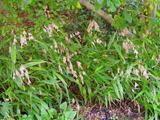Native Plants

Q. Who is Mr. Smarty Plants?
A: There are those who suspect Wildflower Center volunteers are the culpable and capable culprits. Yet, others think staff members play some, albeit small, role. You can torture us with your plant questions, but we will never reveal the Green Guru's secret identity.
Did you know you can access the Native Plant Information Network with your web-enabled smartphone?
Ask Mr. Smarty Plants is a free service provided by the staff and volunteers at the Lady Bird Johnson Wildflower Center.

rate this answer
Sunday - June 28, 2009
From: Pittsburgh, PA
Region: Mid-Atlantic
Topic: Deer Resistant
Title: Deer resistant plants for erosion control on steep hill
Answered by: Nan Hampton
QUESTION:
I would like control a steep hill behind my house that is red clay, northern exposure with little sun. What plants would you recommend that deer will not eat?ANSWER:
Grasses are ideal for erosion control because of their extensive fibrous root systems. Additionally, deer rarely eat grasses. Below are grasses native to Pennsylvania that will grow in clay soils in part shade (2 to 6 hours of sun per day).Bouteloua curtipendula (sideoats grama)
Chasmanthium latifolium (Inland sea oats)
Elymus canadensis (Canada wildrye)
Schizachyrium scoparium (little bluestem)
Deer also rarely eat ferns and ferns are ideally suited for shady sites. Here are a few that are native to Pennsylvania.
Osmunda cinnamomea (cinnamon fern)
Pteridium aquilinum (western brackenfern)
Woodwardia areolata (netted chainfern)
Here are other plants that you could add to the grass or fern mix that are native to Pennsylvania and deer resistant.
Amorpha fruticosa (desert false indigo)
Asclepias tuberosa (butterfly milkweed)
Monarda fistulosa (wild bergamot)
Oenothera speciosa (pinkladies)
Ratibida columnifera (upright prairie coneflower)
Phyla nodiflora (turkey tangle fogfruit)
Solidago nemoralis (gray goldenrod)
More Deer Resistant Questions
Non-native mimosa as deer food in Colerain, NC
June 20, 2009 - I was wondering if deer eat any part of the mimosa tree? I have three good sized trees in my yard with seedlings popping up everywhere. Would it be profitable to transplant for deer habitat?
view the full question and answer
Deer--resistant plants for Great Falls, VA
August 16, 2010 - We have just moved to a house with a rural garden enjoyed by us and the deer. Can you recommend any deer resistant plants for ths location ? ( We have full sun and shade - zip code 22066.
Thanks,
view the full question and answer
Flowering Deer Resistant Ground Cover for Dry Rocky Soil: Alabama
March 26, 2012 - My question has been partially answered in the FAQ but I live in Birmingham where the soil is clay and rocky so it's a little different. I want to plant on a rocky slope (small rocks like the size of...
view the full question and answer
Holly attacked by deer in Connecticut
March 18, 2009 - My holly bush was eaten by deer. Will the leaves come back or is it done?
view the full question and answer
Deer Resistant Plants for Northern Virginia
September 22, 2010 - I'm looking for deer resistant shade plants in Northern Virginia. The deer have devoured my hostas, impatiens and native toad lily plants, day lilies.
view the full question and answer
| Support the Wildflower Center by Donating Online or Becoming a Member today. |

